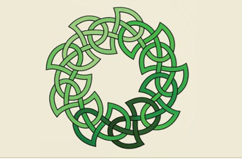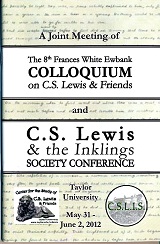Event Title
Academic Paper Session 1-A
Location
Rupp 203
Start Date
31-5-2012 7:45 PM
Description
"The Christian World of The Hobbit" - Devin Brown
In our present day, reasoned and informed thinking and a sense of the past seem to have fallen on hard times. In an almost prophetic way, C.S. Lewis in his book, The Abolition of Man, seems to have foreseen that if modern man continues to treat himself as a natural object cut off from the past and attempts to make value judgments based simply on natural impulses, then man himself will be viewed as simply a product of nature and, man as man, will be abolished. If Lewis is correct about this trend concerning modern man and his being cut off from the past, what can be done to reverse the situation? What Lewis is calling for by admonition and by example is a deeper understanding of the past and a return to the classics, or great books, in order to better understand our present and to prepare ourselves for the future.
"Examining the Characters of Two Minor but Nevertheless Heroic, Characters - Sam and Gimli - as They Relate to the Heroic Journey as Described by Campbell" - Jan Prewitt
Joseph Campbell in his seminal book The Hero with a Thousand Faces says in the final chapter, "The Hero Today," that unlike the classical hero, the modern hero faces a world that does not embrace a single mythology. "Then all meaning was in the group, in the great anonymous forms, none in the self-expressive individual; today no meaning is in the group--none in the world: all is in the individual" (334). That does not mean, however, that there are no heroes in the modern world or that the modern world requires no heroic figure--quite the contrary. The modern world's need is greater now than in years ago because the modern world does not see or even acknowledge its need of a hero. Into this modern heroic J.R.R. Tolkien provides in his Lord of the Rings trilogy, not one, but several heroic figures that demonstrate the surviving appeal of the classical hero in the modern age. The proposed paper will examine the characters of two minor, but nevertheless heroic, characters--Sam and Gimli--as they relate to the heroic journey as described by Campbell.
"The Subtle Agenda of Tolkien's Narrator of The Hobbit" - Anderson M. Rearick III
In Tolkien lore, the narrator of The Hobbit is the only human connection to the world of Middle Earth. He is not, as some have suggested, a hobbit himself. In spite of his humanness, however, he apparently has a great amount of information about the time in the world "when there was less noise and more green." He is also a narrator with opinions. In fact it is clear that for the narrator the whole telling of The Hobbit is a teaching tool; however much adults may enjoy Bilbo's adventure, the teller is talking to children. Being a creation of Tolkien's special imagination The Hobbit's narrator deserves more study to determine his purpose and his true nature.
Event Type
Paper
Link to Papers
The Christian World of The Hobbit (Not available)
Hidden Heroes in Tolkien's Lord of the Rings
Father Knows Best: The Narrator's Oral Performance as Paternal Protector in The Hobbit
Academic Paper Session 1-A
Rupp 203
"The Christian World of The Hobbit" - Devin Brown
In our present day, reasoned and informed thinking and a sense of the past seem to have fallen on hard times. In an almost prophetic way, C.S. Lewis in his book, The Abolition of Man, seems to have foreseen that if modern man continues to treat himself as a natural object cut off from the past and attempts to make value judgments based simply on natural impulses, then man himself will be viewed as simply a product of nature and, man as man, will be abolished. If Lewis is correct about this trend concerning modern man and his being cut off from the past, what can be done to reverse the situation? What Lewis is calling for by admonition and by example is a deeper understanding of the past and a return to the classics, or great books, in order to better understand our present and to prepare ourselves for the future.
"Examining the Characters of Two Minor but Nevertheless Heroic, Characters - Sam and Gimli - as They Relate to the Heroic Journey as Described by Campbell" - Jan Prewitt
Joseph Campbell in his seminal book The Hero with a Thousand Faces says in the final chapter, "The Hero Today," that unlike the classical hero, the modern hero faces a world that does not embrace a single mythology. "Then all meaning was in the group, in the great anonymous forms, none in the self-expressive individual; today no meaning is in the group--none in the world: all is in the individual" (334). That does not mean, however, that there are no heroes in the modern world or that the modern world requires no heroic figure--quite the contrary. The modern world's need is greater now than in years ago because the modern world does not see or even acknowledge its need of a hero. Into this modern heroic J.R.R. Tolkien provides in his Lord of the Rings trilogy, not one, but several heroic figures that demonstrate the surviving appeal of the classical hero in the modern age. The proposed paper will examine the characters of two minor, but nevertheless heroic, characters--Sam and Gimli--as they relate to the heroic journey as described by Campbell.
"The Subtle Agenda of Tolkien's Narrator of The Hobbit" - Anderson M. Rearick III
In Tolkien lore, the narrator of The Hobbit is the only human connection to the world of Middle Earth. He is not, as some have suggested, a hobbit himself. In spite of his humanness, however, he apparently has a great amount of information about the time in the world "when there was less noise and more green." He is also a narrator with opinions. In fact it is clear that for the narrator the whole telling of The Hobbit is a teaching tool; however much adults may enjoy Bilbo's adventure, the teller is talking to children. Being a creation of Tolkien's special imagination The Hobbit's narrator deserves more study to determine his purpose and his true nature.


